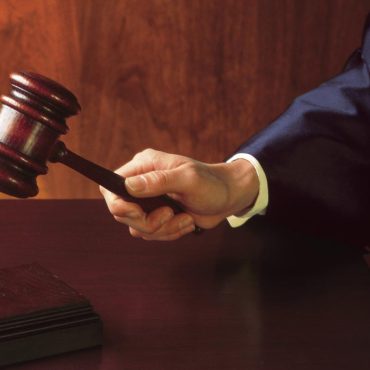This is a rush transcript. Copy may not be in its final form.
AMY GOODMAN: This is Democracy Now!, democracynow.org, The War and Peace Report. I’m Amy Goodman.
We end today’s show with Yale historian and author Timothy Snyder, author of numerous books, including On Freedom and, before that, On Tyranny: Twenty Lessons from the Twentieth Century. Professor Snyder published On Tyranny in February of 2017, just a month after Donald Trump took office. The first lesson in the book is “Do Not Obey in Advance.” Snyder wrote, quote, “Most of the power of authoritarianism is freely given. In times like these, individuals think ahead about what a more repressive government will want, and then they offer themselves without being asked. A citizen who adapts in this way is teaching power what it can do.”
Snyder’s warning was widely cited after ABC News settled a defamation suit filed by President-elect Trump, instead of taking the case to court. As part of the deal, ABC will donate $15 million to Trump’s presidential library.
Meanwhile, three prominent tech billionaires — Amazon founder Jeff Bezos, Facebook founder Mark Zuckerberg and Sam Altman of OpenAI — have reportedly agreed for their companies to donate a million dollars each to Trump’s inaugural fund. Zuckerberg, who once banned Trump from Facebook, recently dined with Trump at Mar-a-Lago. On Wednesday, Bezos, who also owns The Washington Post, dined with Trump and Elon Musk, the world’s richest man, who’s being described by some as the shadow president. I mean, in this looming government shutdown, it was Elon Musk who first tweeted on his social media platforms X threatening any Republican congressmember who voted for, at that time, the bill, and then Trump did his warnings. People then started referring to President Musk and Vice President Trump.
Well, Timothy Snyder, welcome back to Democracy Now! Let’s start with the ABC settlement, George Stephanopoulos saying that President Trump had been found liable in a civil trial of rape, because the judge in the case said that Trump had been found liable for sexual assault, which in common parlance, the judge said, was rape. Many felt ABC had a very strong leg to stand on. They were about to do discovery, and suddenly ABC settled. Your response?
TIMOTHY SNYDER: Yeah. If I could, I first want to — I want to make a segue from your last segment, because there is a direct connection between healthcare and the ability of normal people not to obey in advance. One of the reasons why we have the absence of healthcare in this country that we do is to make people afraid and anxious and worried all of the time. And that is a kind of social wellspring for authoritarianism. It’s harder to do the things you need to do politically if you’re being dogged all the time by unnecessary fears and costs and when you’re sick when you don’t have to be.
Anyway, as far as the big wealthy media companies are concerned, I think ABC saw the chance to do what everybody else was doing, in a rapid way, and sacrificed itself to make this statement, that, “Yes, we’re not going to say these kinds of things.” Because the problem of giving up here isn’t just the individual case; it’s the precedent you set. You’re saying, “We’re going to be extremely careful not to say the kinds of things which might offend or which might be critical to this person who is now going to be the head of state.”
AMY GOODMAN: And as soon as that settlement happened, President-elect Trump sued The Des Moines Register for a poll that came out right before the election that he didn’t like the results of.
TIMOTHY SNYDER: Yeah, I mean, there, we’re moving squarely into totalitarian territory, because when Trump sues The Des Moines Register for essentially printing what he considers to have been bad news for him, the underline all of that is the idea that Trump never could have been behind in any poll. Trump never could have won any election. Our great hero Trump is always going to win at everything. So, it’s setting a line — right? — which borrows from his deep lie that he didn’t win the election — that he won the election in 2020. So, he is trying to set, I mean, what is, in effect, a kind of Stalinist line for the American media: Everyone has to only print how Trump wins everything all the time, or you might get sued.
AMY GOODMAN: So, if you can jump from that to what we’re seeing now with the billionaire Cabinet? What, you know, Elon Musk, now it looks like, spent about a quarter of a billion dollars to get Trump elected. And people might say, “Wow! That’s a lot. He took a great risk there.” But he has made far more than that since the election of President Trump. If you can talk about what it means — I think, in Biden’s Cabinet, they’re worth something like $110 million; in this Cabinet, well over, what, $500 billion?
TIMOTHY SNYDER: Oh, yeah. So, I mean, it’s a small jump to make, because the way that censorship is going to work in the Musk-Trump regime is probably not going to be direct state censorship. It’s going to be hundreds of frivolous lawsuits which are meant to keep us all quiet. And who’s going to fund those frivolous lawsuits? Not Trump. He doesn’t have the money. It’s going to be Musk who’s funding these frivolous lawsuits to keep us all quiet and to keep us towards the line that, of course, he and Trump never do anything wrong, always win and so on. What we’re looking at is a qualitative change. Of course, there’s too much money in every cabinet, but we’re now leaping orders of magnitude up, right?
So, for example, when these — if a centibillionaire gives a million dollars to Trump’s inauguration, that might sound like a lot, but that’s the same as the median American family giving $2. It’s meaningless for the centibillionaire to give that amount of money. Likewise, it was meaningless even for Musk to spend a quarter of a billion on Trump’s campaign. The guy is worth something like $400 billion now. That meant nothing to him, and the return to investment was absolutely enormous.
So, we’re shifting from a democracy, which had some pretty heavy oligarchical streaks running through it, toward something like an oligarchy, in which I think it’s fair to say that it’s not Trump who’s the most important person. It’s Musk. Trump has debts. Musk has money. Trump has debts specifically to Musk for getting him elected. And I think the burden of proof is actually on Trump to show that he has any room for maneuver in this system. And it’s going to be interesting to see how congressional Republicans react, because what this particular oligarch wants is to break the federal government. And whatever their views might be, not — many of them don’t actually want the United States of America to cease to exist so that oligarchs can pick up the pieces.
AMY GOODMAN: Let me ask you about MSNBC. You had the regular Trump critics Joe Scarborough and Mika Brzezinski for a few years now really criticizing Trump, and then, after he won, going down to Mar-a-Lago to have dinner with him.
TIMOTHY SNYDER: Yeah. I mean, I think the essential thing is not whether you criticize Trump or whether you don’t criticize him. I don’t think it’s all about Trump. I think the essential thing is: Do you have — are you seeking after truth? Are you doing investigative stories? Are you saying the things you’re truly convinced of, based on the results of your investigations and the facts?
I think it doesn’t make sense to court somebody like Trump, just psychologically, because he’s into humiliation both directions. He wants to humiliate you, and then he wants himself to be humiliated by the guys he regards as bigger men, people like Musk and by Putin. So, for him, it’s all a humiliation chain, and you’re just telling him which side of the humiliation chain you want to be on. So, I think, politically, it’s not really very effective.
But I think the most important thing for the press is to do the job of the press and not to think of everything in terms of paying obeisance or not paying obeisance. The press needs to be itself.
AMY GOODMAN: The significance — I mean, you have Amazon founder Jeff Bezos, who owns The Washington Post. He stops the endorsement of Kamala Harris of his editorial board. Same thing at the Los Angeles Times with Patrick Soon-Shiong doing the same there, intervening and now being quite involved with the editorial process. You have the million-dollar donations to the inaugural committee of President Trump, the inauguration, with million-dollar contributions each coming from, what, Zuckerberg, from Bezos and more.
TIMOTHY SNYDER: I mean, again, with those million-dollar contributions, it’s kind of funny, because since Trump, as a fake rich person, he thinks that’s a lot of money, right? But for them, it’s literally nothing.
AMY GOODMAN: I think it’s a lot of money.
TIMOTHY SNYDER: Yeah, exactly. For us, it’s a lot of money, right? So, for Americans, this is the problem with oligarchy. It’s the problem with huge wealth inequality. The math is staggering. We can’t really grasp it, right? A million dollars would be absolutely life-changing for 99.9% of Americans. But for these people, it’s literally the equivalent for the median American family of $2. It means nothing to them. It’s just symbolic. It’s just symbolic obeisance to Trump.
But I want to jump back to the L.A. Times and The Washington Post. There is a problem when the people who have the most money set the example of yielding to power first. It’s a problem. They shouldn’t do it. It is obeying in advance. It’s textbook anticipatory obedience. It’s absolutely 180 degrees not what they should have done.
That said, in the regime that’s coming, not obeying in advance means that little people, little organizations, little groups, municipalities, judges, NGOs, we have to all not obey in advance. We can’t take our lead from these people. Not obeying in advance is always going to be tense, because other people —
AMY GOODMAN: Five seconds.
TIMOTHY SNYDER: — are going to obey in advance: very powerful people. So we have to not behave the way the powerful are behaving.
AMY GOODMAN: Timothy Snyder, professor of history at Yale University, author of numerous books, including On Freedom and On Tyranny. I’m Amy Goodman. Thanks so much for joining us.











Post comments (0)